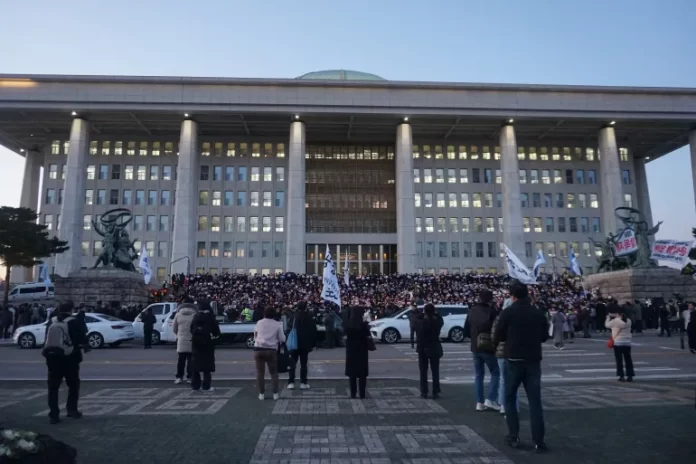Seoul, South Korea – On December 4, 2024, South Korea awoke to the aftermath of an unprecedented political drama. The previous night, President Yoon Suk Yeol imposed martial law, citing the need to “protect the country from North Korean communists and eliminate antistate elements” while vowing to “rebuild and protect the nation.”
Troops blockaded the National Assembly building late on December 3, ostensibly to prevent lawmakers from interfering. However, the attempt failed spectacularly as legislators convened and swiftly voted to lift martial law within two hours, marking the shortest such imposition in the country’s history.
By the morning of December 4, South Koreans carried on with daily life, but the political landscape remained fraught. Outside the National Assembly, hundreds of protesters gathered alongside opposition Democratic Party members, who introduced a motion to impeach Yoon.
Public Outcry and Political Fallout
“There was no procedural legitimacy in the president’s actions,” said Shin Byung-soo, a protester holding a candle. “He disregarded the wellbeing of the people for unilateral decisions.”
Min Jun-shik, a 43-year-old office worker, joined the demonstrations after work. “Yoon lacks the capabilities of a president,” Min stated. “This reminds me of the 2017 protests against Park Geun-hye. Our economy is already struggling, and this has further tarnished our country’s reputation.”
Park, South Korea’s first impeached president, was removed from office following corruption charges. Yoon, whose approval ratings have plunged to 25 percent, faces mounting criticism for destabilizing the country’s democratic image.
Legacy of Democracy Threatened
South Korea, often lauded for its democratic progress, was reminded of its tumultuous past. Martial law declarations were hallmarks of military dictatorships that ruled until democratization in 1988, including during the Gwangju Uprising of 1980, a pro-democracy protest violently suppressed by security forces.
“This move undermines South Korea’s global reputation as a thriving democracy,” said Chung Joo-shin, director of the Korea Institute of Politics and Society. “Yoon’s actions were neither justified nor strategically sound.”
For citizens like Jeon Hyun-jung, whose mother witnessed the Gwangju Uprising, the brief return of martial law was deeply unsettling. “Hearing helicopters and armored vehicles through my friend’s phone brought back fears of history repeating itself,” she said.
Calls for Change
The fallout has reignited debates about South Korea’s political leadership. “We lack leaders that children can look up to,” said Lee Gil-bok, a 65-year-old from Paju. “Politicians prioritize their own interests over the nation’s wellbeing.”
As South Korea navigates the political turbulence, the failed coup attempt stands as a stark reminder of the fragility of democratic institutions, even in a country celebrated for its democratic achievements.
(with Agency inputs)










